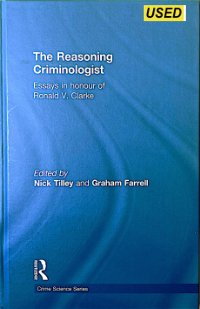May Contain Mark-Ups
Edited by Nick Tilley and Graham Farrell
“The Reasoning Criminologist”is a tribute to Professor Ronald V. Clarke, celebrating his significant contributions to criminology and crime science, particularly in situational crime prevention. Edited by Nick Tilley and Graham Farrell, the book features essays from leading criminologists who are Clarke’s colleagues or former students. These essays cover theoretical and empirical contributions to situational crime prevention, rational choice theory, environmental criminology, evaluation, and problem-oriented policing.
Situational Crime Prevention (SCP): Clarke’s development of SCP focuses on reducing crime opportunities through environmental design and management,increasing the effort and risks for offenders, and reducing rewards.Problem-Oriented Policing (POP): Clarke’s work has significantly influenced POP,which emphasizes addressing specific problems through scientific methods and careful analysis.
British Crime Survey: Clarke played a crucial role in establishing this survey,which provided valuable data on unrecorded crime and influenced SCP strategies.
Focused Deterrence Strategies: The book discusses the integration of SCP with focused deterrence strategies, which involve identifying key offenders, leveraging a variety of sanctions, and directly communicating with offenders to deter crime.
Multidisciplinary Approach: The Crime Science Series, edited by Richard Wortley,presents crime science as a multidisciplinary approach involving criminology, sociology, psychology, geography, economics, architecture, industrial design, epidemiology, computer science, mathematics, engineering, and biology.
Routledge, 2013, 260 pages



